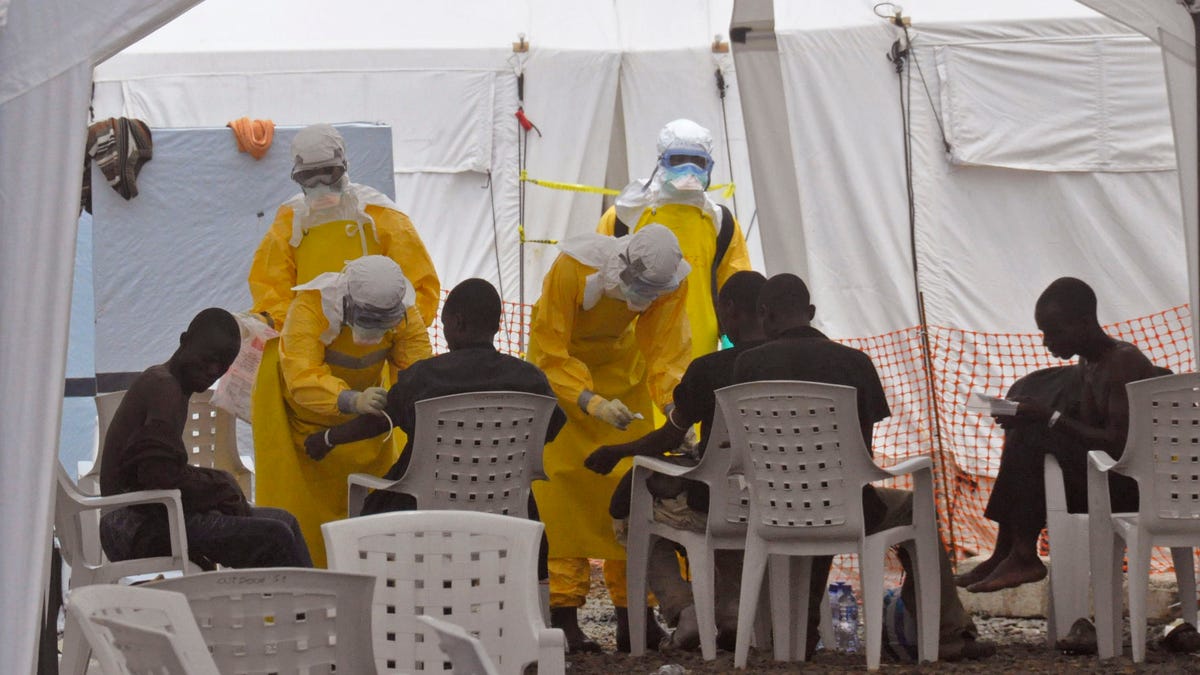African Union officials warn efforts to stop Ebola are stigmatizing
{{#rendered}} {{/rendered}}
Health workers, attend to patients that contracted the Ebola virus, at a clinic in Monrovia, Liberia, Monday, Sept. 8, 2014. (AP Photo/Abbas Dulleh) (AP2014)
Border closures, flight bans and mass quarantines are creating a sense of siege in the West African countries affected by Ebola, officials at an emergency African Union meeting said Monday, as Senegal agreed to allow humanitarian aid pass through its closed borders.
The largest Ebola outbreak ever has killed more than 2,000 people and public health officials say it is out of control. But they have criticized some of the more extreme efforts to slow the disease's spread, saying that border closures have hampered the response by holding up shipments of aid.
They have also noted that, in a highly mobile region like West Africa with several unofficial border crossings, closing frontiers is usually ineffective. The current Ebola outbreak began in Guinea and quickly spread across the border into Liberia and Sierra Leone. More recently, a sick Liberian-American man flew to Nigeria, infecting several people, and a Guinean student with the disease took a bus to Senegal, the first and only case recorded there.
{{#rendered}} {{/rendered}}Ebola is spread through the bodily fluids of people who are symptomatic, so the World Health Organization has urged simple screening of travelers for a fever or other signs of Ebola instead of blanket travel bans.
Many countries in the region have ignored that advice, however. Senegal, for instance, has shut its land border with Guinea and suspended flights from Liberia and Sierra Leone. But the Health Ministry announced Monday that it would open a "humanitarian corridor" to the affected countries. It gave no details, and it was not clear when people and goods would be moved into those three hardest-hit countries.
Humanitarian agencies would like to use the Senegalese capital, Dakar, as a staging ground for sending in health workers and supplies to the most affected countries. To combat the crisis, U.S. President Barack Obama also said Sunday that the American military will be helping set up isolation units and equipment there and providing security for public health workers flocking in from around the world.
{{#rendered}} {{/rendered}}"The drive to protect unaffected areas is the proper response, but it must be done in a manner that does not fuel isolation, or lead to the stigmatization of victims, communities and countries," said Nkosazana Dlamini Zuma, chair of the African Union Commission, which was meeting Monday in Addis Ababa, Ethiopia, to draft a response to the crisis. "We must ensure solidarity with those most affected so that we assist their institutions to address their challenge."
The continental bloc has promised to send in badly needed health care workers, but there are concerns about whether there is enough protective gear to keep them safe. Doctors and nurses are at high risk of infection because of their close proximity to the sick and a higher proportion of health workers have become infected in the West African outbreak than in any other previous one. Officials have said that flight bans are making it hard to get the necessary quantity of protective suits into the affected countries.
Some countries have also cordoned off entire towns or counties in an effort to slow the disease's spread, but those measures have kept farmers from their fields, slowed the delivery of food and forced markets to shut. The U.N. has said that around 1.3 million people in those isolated areas will need food assistance in the coming months.
{{#rendered}} {{/rendered}}Liberia's vice president visited one of those cordoned-off places this weekend, saying that the disease appeared to have touched nearly everyone in Lofa county.
"Everybody was looking like they'd just passed through some difficulties with bereavement," said Joseph Nyumah Boakai, who is from Lofa. "Some families were wiped out completely."
Boakai said Ebola was able to spread in Lofa so quickly in part because people initially resisted help. That pattern has been repeated throughout the region, where people are unfamiliar with the disease and mistrust in governments tends to run high.
{{#rendered}} {{/rendered}}But Boakai said the tide was beginning to turn.
"After all of that, they were now coming to terms with the sickness," he said following his visit. "The reality was hitting them that this thing was real, that it was nothing to play with, they were now observing the rules."
In Nigeria, authorities are monitoring 477 people in the southern oil hub of Port Harcourt who came into contact with infected people.
